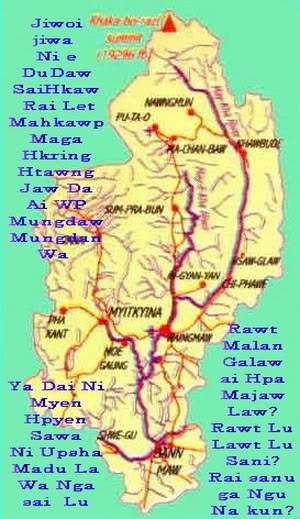By SAW YAN NAING
FANG, Thailand – Hundreds of ethnic Shan, Lahu, Chinese and Thai businesspeople, including some families of United Wa State Army (UWSA) personnel, have moved to the Thai-Burmese border area because they fear a serious flare-up of fighting between Burmese government troops and UWSA units based in southern Shan State.
Several thousand UWSA soldiers and their families live in southern Shan State opposite Fang District of Thailand's Chiang Mai Province. The UWSA, which has about 25,000 men in uniform, is under pressure from the Burmese regime to become a border guard force.
The departure of many local people to the relative safety of the Thai-Burmese border began in earnest on April 22, when a regime deadline ran out for the UWSA to agree to transform itself into a border guard force. Reports circulated that the Burmese army was planning to launch an offensive against UWSA units in southern Shan State.
Clashes already occurred between UWSA units and Burmese troops on April 23 and 24, according to Thai soldiers posted at Ang Khang hill, about 23 kilometers from the Fang District border with Shan State.
Following the clashes, Thai troops were deployed near Nor Leang village on the Thai-Burmese border, according to local residents.
The Thai army has also closed border trails in the Nor Leang area, fearing mortar shells could land on Thai territory.
Two local schools have also been closed and children moved to safety.
Some Chinese nationals living in southern Shan State have moved to Panghsang, the UWSA headquarters in northern Shan State. Some Thai nationals have also returned home, according to sources on the Thai-Burmese border.
Aung Kyaw Zaw, a Burmese observer on the Sino-Burmese border said about 2,000 Chinese in southern Shan State had moved to northern Shan State to avoid a possible outbreak of hostilities.
Sources said some Wa families had sold their livestock, cars, motorcycles and other personal belongings for knockdown prices before moving to the border region opposite the Mae Ai District of Chiang Mai province.
The Thai army has urged ethnic Shan refugees at Khone Kyor camp in Wiang Haeng District to remain on alert, according to the camp committee. More than 600 refugees live at the camp.
A Shan refugee said: “The Thai army came to our camp and told us two days ago not to worry and that if we heard shooting they will come and pick us up in trucks and take us to a safe place if fighting occurs.”
Maj Sai Lao Hseng, a spokesman for the Shan State Army (SSA-S), said some mortars had landed on Thai territory when fighting broke out between the SSA-South and Burmese government forces in 2003.
Sai Lao Hseng said the Burmese army probably shelled UWSA troops on April 23 and 24 by mistake, thinking they were SSA-S troops.
Residents in the area of the Burmese-Thai border town of Tachileik have also reportedly been moving to safety in Thailand.
Further north, in Kachin State, some people have been moving to China from Laiza, headquarters of the Kachin Independence Organization (KIO), fearing an outbreak of fighting there, according to a resident of Myitkyina.
Some had crossed into China with border pass permits and were staying with relatives in Yunnan Province, said one visitor.
Thai military authorities have warned that thousands of refugees will flee into Thailand if war breaks out in southern Shan State. An influx of drugs into Thailand's Chiang Mai and Chiang Rai provinces is also highly expected, according to Pornthep Eamprapai, the director of the Office of the Narcotics Control Board in Chiang Mai.
About 30,000 people, including Chinese residents of the Kokang capital, Laogai, fled to China when Burmese government forces attacked the ethnic Kokang ceasefire group known as the Myanmar National Democratic Alliance Army in August 2009.
Apr 29, 2010
Subscribe to:
Post Comments (Atom)
WUNPAWNG MUNGDAN SHANGLAWT HPUNG A NINGGAWN MUNGMASA
WUNPAWNG MUNGDAN SHANGLAWT HPUNG A NINGGAWN MUNGMASA
CHYE JU KABA SAI
Sa Du N'Gun Jaw La ai Majaw N'chying wa Chyeju Dum Ga ai,Yawng a Ntsa Wa Karai Kasang Kaw na N'Htum N'Wai ai Shaman Chye ju Tut e Hkam La Lu Nga mu Ga law




No comments:
Post a Comment